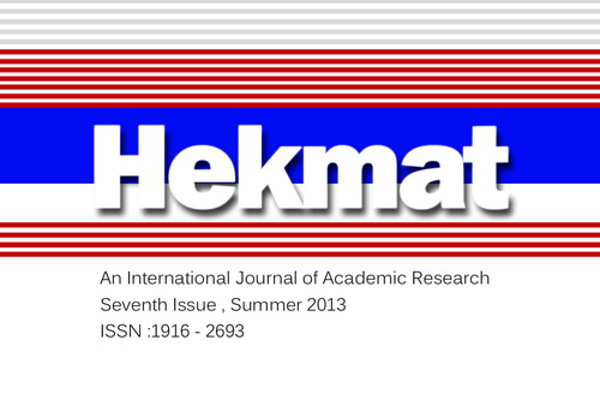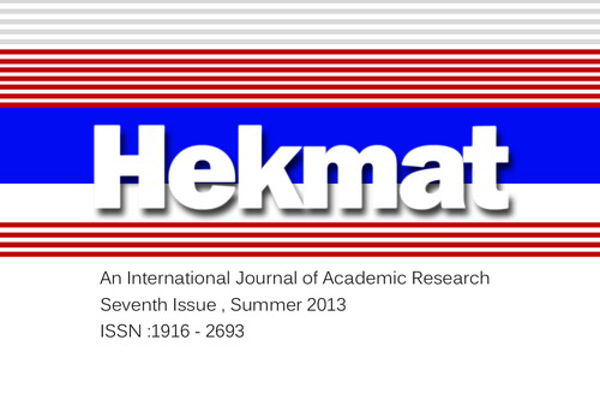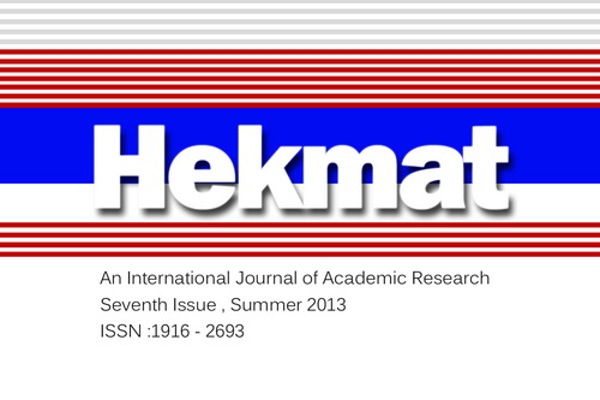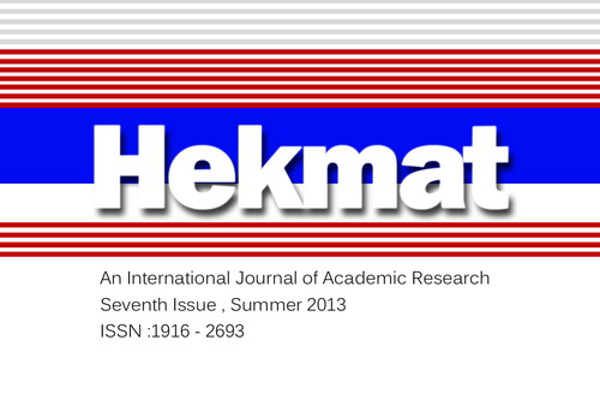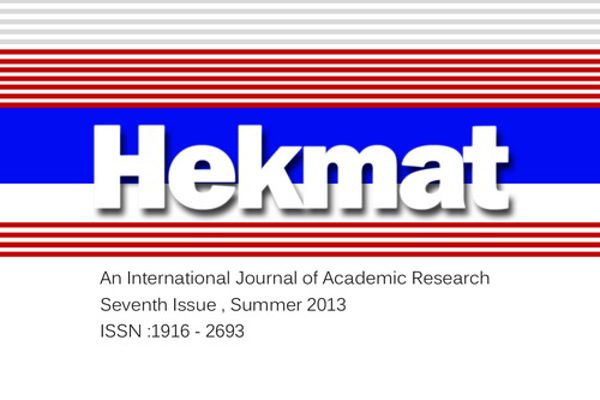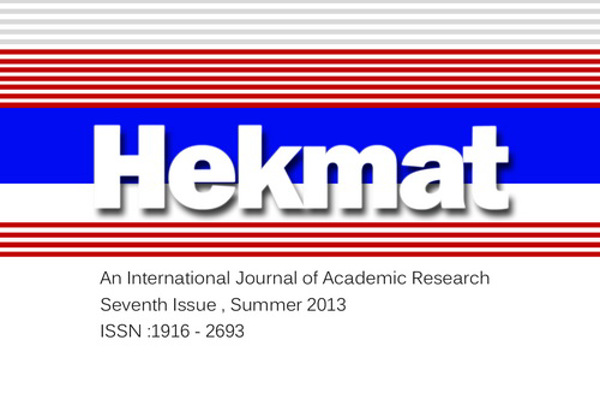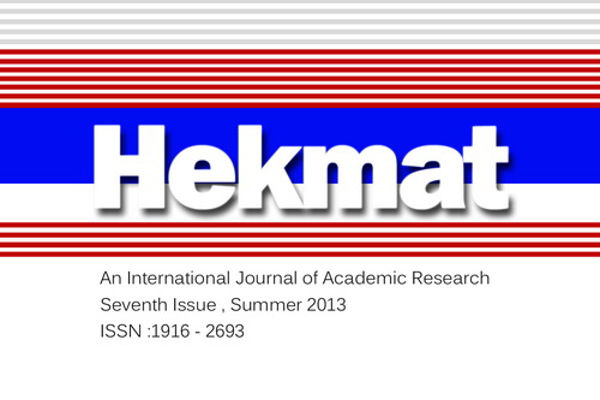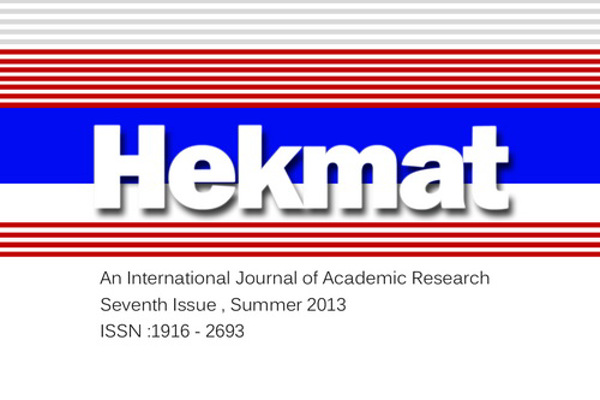Characteristics of the right spouse / By: Mohammad Reza Salari far
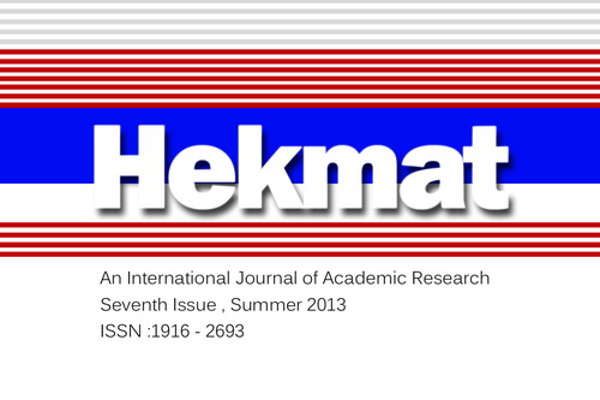
Characteristics of the right spouse
By: Mohammad Reza Salari far[1]
Abstract
The attitudes and worldview an individual adopts directly affects their way of choosing a spouse. People's criteria for the right spouse stem from their personal characteristics as well as their beliefs. Religiosity plays a vital role. In this paper, we will try to explain the criteria for the right spouse from an Islamic perspective. To do so, we will begin by examining such criteria in family sociology, and then compare them with the criteria set by religious texts. From this perspective, important qualities for a suitable spouse include strong belief, piety, moral virtues, compatibility, and mental and physical health. There are other criteria such as equality in social rank and relative attractiveness which are contextual.
Key terms: faith, morality, religious Outlook, finding spouse, inequality, woman
Introduction
The most important role in the process of finding a spouse is played by an individual's beliefs. For, beliefs originate from culture, tradition, and the creed that are predominant in the society where the individual has grown up. In general, the worldviews people adopt can be divided into two main groups; materialistic and theistic. For example, a theistic worldview recognizes a particular purpose in human life hence in marriage, which a materialistic one dismisses. According to the aims people pursue in life, their criteria of a good spouse vary.
Before explaining the criteria based on which people opt for spouses, we shall explain the effect of worldview on the selection of spouse. Then, we will proceed to explain the criteria set by family sociology. In Islamic thought, these criteria may be classified into two groups. One is the general cross-cultural, immutable, fundamental, and necessary conditions. Another group comprises of relative or contextual conditions which are arranged in the order of importance. Then, we shall discuss the ways of understanding how these conditions are realized.
The effects of worldview on choosing spouse
By worldview, we mean the general understanding and interpretation of existence by an individual. This includes the attitudes toward the physical world and beyond, the purpose of the creation, and the general laws governing the universe, human being, and their life. Everybody enjoys their own worldview which may be based on scientific understanding, rational reasoning, or else on unsophisticated understanding of the lay man (Motahhari, 1378, volume 3, page 24).
Considering different definitions given for worldview (Neck Mendelson, 1967, vol. 16, page 577), we can gather that it consists of two main parts; the general attitude towards the world such as belief in metaphysical being like God, and one’s understanding of human nature with its innumerable aspects.
People's attitude towards human being and various existential facets of human life is constructed on the basis of sensible, scientific, rational, and revelation-based sources. This attitude has evolved throughout ages. Religious beliefs bear upon worldview intimately. Divine religions, particularly Islam, declare that the creation of the world and human life has a purpose. Consequently, in a theistic outlook to the universe, the entire world is dependent on divine will. The overall movement of the universe is directed towards Him. Contrary to this approach, a materialistic attitude toward the world neglects the Creator and His purposes and design. This attitude drastically changes our understanding of life and dimensions of human nature and interpretation of historical and social developments. It is on the basis of the worldview an individual adopts that their value system is founded. Every school of thought and every ideology originates in a particular worldview (Motahhari, 1367, page 13).
Both parents’ behavior and the educational system rely on a particular worldview and special attitude towards human beings. The majority of human beings believe in theism or in a religion of some other kind. Depending on the setoff beliefs which a religion is based on, it issues some advice for people's personal, social, and professional life. Most of economic rules and regulations have their root in a kind of worldview, religious or otherwise.
Marriage and family ties occupy a very prominent place in human life. They are considered as the foundation of social relationship. People's attitudes are vividly reflected in their family ties and marriage. People's attitude affects directly the way they opt for a spouse, administer their family, and solve their problems. Some criteria for a good spouse may be common among different ideologies. But surely, there are characteristic criteria peculiar to every ideology.
In this paper, we will begin with explaining the criteria social knowledge describes before going to criteria for choosing a spouse from an Islamic perspective.
Criteria for choosing spouse
In the past, the persons who decided to marry used to play an inferior role in the process of choosing their partners compared to the role the elderly such as the parents played. One reason for this fact was that the couples especially girls were too young. In addition to this, dependence of new married couples on the extended family for support naturally gave the family the initiative. As the independence of individuals from family grows, the role of the parties to marriage grows too. Nowadays, it is the boy and the girl who would freely decide about the most important event in their life. Still, in opting for the future life mate, boys and girls should strictly follow very complicated rules in which both emotions and rationality play a part. The role of parents is still decisive.
The criteria according to family psychology
In family psychology, there are five categories of criteria for a suitable spouse; physical, psychological, economical, social, and family wise (Sarukhani, 1991, p. 33).
The physical criteria
The physical criteria constitute five factors:
- physical health
- difference in age (Seddiq Auraai, 1995, p. 91)
- beautiful face and shape of the body that forms the reaction of the majority of people in the first place despite all of the wise advices in almost all cultures about the importance of inner moral traits. Studies show that this applies to men more than women (Azarbaijani, 2003, p. 257)
- Fertility which once occupied very prominent a place in choosing the wife since it was considered a very important female characteristic. Nowadays, however, this factor has been diminished and fertility is seen as quite an important factor in both genders.
- Race and ethnicity represented by skin color is still a factor. Some authors believe that human beings instinctively go for mates of their own race. Although this tendency is seen to be weakening, it still exists in a considerable percentage of the populace (Sarukhani, 1370, page 51).
The psychological criteria
Psychologists define this category of criteria through the following factors:
- Studies about the correlation between intelligence equality of couples and their feeling of happiness in matrimonial life show that equality of the couples in intelligence occupies a prominent place. When one of the partners feels superior in this respect, they feel less satisfied with their matrimonial life (ibid. p. 63).
- Education is now seen by the younger generation looking for mates as a particularly important factor. The increase in the number of marriages among university students somehow shows that this attitude is becoming the mainstream.
- Commonalities between couples in their attitude toward life attract future mates to one another (Azarbaijani, 2003, p. 256).
- Personality and emotions peculiar to one gender are also taken into account. Whether a man can exercise authority in family and his wife can agree and cooperate depend on their emotional structures and personalities.
- Moral characteristics can be counted among psychological criteria. Surveys show that more than half of the people questioned consider moral traits such as sincerity, gentleness, ability to compromise, and temperance as the most important qualities for the right spouse (Iranians’ attitudes and values, p. 38). Behavior constitutes a part of personality psychology. Moral traits form another aspect of personality. So, we can consider these two as psychological factors.
Economic criteria
In evaluating a candidate for marriage, it is wise to test their ability to run a family. From this point of view, one’s profession, wealth, income, skills for home administration and minimizing expenses are taken in into account.
Social criteria
This topic refers to the social class, ethnicity, citizenship, religious tendency, and cultural status in general. Religious affiliations are taken seriously almost everywhere. Among the Jews, in 98% of marriages, the couples are both Jewish. This rate drops only to 93% among Catholics and 74% among Protestants. Typically, people do not choose their mates from lower social classes. It is, however, notable that, in recent years, interclass marriages are on the increase (Sarukhani, 1991, p. 62).
Family
This factor relates to issues such as intra family marriage, the family status of one's mate, the attitude of the family members towards a candidate for marriage.
The principle of marriage among equals
In general, the principle of marriage among equals is universally accepted. Equality in social status, moral characteristics, psychological features, religious tendencies, cultural conditions, and similarity in age, nationality, birthplace, and the like are seen as important criteria that make a successful match possible (Sarukhani, 1991, p. 58).
In a psychological explanation of this principle, we can say that, in the first place, people of similar characteristics are attracted to one another more easily. Their positive emotions are aroused quickly. The correlation between similarity and mutual attraction has been extended to subjects such as cultural, social, and economic status in the case of different age groups in socio-psychological studies. The correlation was found to be significant. From this, we can draw another conclusion; more similarity results in more compatibility. The more compatible two individuals are, the stronger their mutual attraction grows. In quarrels, the parties usually try to change their psychological state to obtain more compatibility since quarrel originates from difference (Azarbaijani, 2003, p. 256). Studies show that when partners are equal, the marriage bound between them remains strong and stable. Investigations into the causes of matrimonial discord reveal that incompatible characteristics are to be blamed. Studies about the degree of matrimonial contentment in different couples show similar results (Sarukhani, 1991, p. 68).
Islamic precepts about choosing a spouse
A glance at Islamic teachings tells us that the aforementioned criteria are endorsed by Islam. But some additional criteria are also set. We can sum up the Islamic approach in the following clauses.
1. Physical features
We can gather from Islamic traditions that health, fertility[2], virginity[3], beautiful face[4], hair[5], and overall structure of body are desirable physical features. It is worthwhile to mention here that Islam does not recognize complexion as an important criterion of a good mate because it implies race discrimination[6].
2. Psychological features
Among psychological features that matter are sufficient intelligence[7], moral traits, appropriate behavior, and personal characters such as loyalty and modesty to one's husband (for women), being easy-going, having temperate behavior, trustworthiness, thankfulness, being compassionate, being loving with family members, cooperativeness, being submissive in sexual affairs, and finally, forbearance and the ability to resist hardship (Suti, 1404 lunar Hegira, vol. 1, p. 152).
3. Economic capability
It is very important that the person one selects as a spouse enjoys the necessary skills required for administering family affairs. The wife, for instance, should be capable of helping her husband in managing home affairs. Small mahr[8], asking limited and reasonable expenditure on marriage formalities and celebration, and controlled personal expenses are important qualities for the right wife.
4. Religious qualities
Belief in God, in the life after death, resurrection, divine reward and punishment, trust in God and asking Him to help us overcome obstacles in life are signs of religiosity. Religiosity is manifested in particular emotions and behaviors such as enjoining one's spouse to tolerate, practice piety, avoid sins, observe chastity and Hijab, and finally, following religious leaders.
5. Social cultural conditions
Candidates for marriage should be equal socially and culturally. In some traditions, marrying people from some regions or tribes are declared prohibited (Hurr Ameli, 1991, vol. 14, p. 54). Satisfactory explanation of such traditions is to say that people addressed in these traditions belonged to different cultures or zones. As a result, intercultural marriages at that time would lead to matrimonial problems. It goes without saying that from an Islamic perspective, belonging to a region, tribe, or ethnic group means neither superiority nor inferiority. The variety in race and ethnicity merely aims at better intermingling.
6. Family
Family affiliation can be considered as a positive factor in choosing a mate. There are some hints to possible side effects of intra family marriages though. To reconcile these two facts, we can say that family affiliation is a contextual factor. If other required conditions are met, then, this factor may be considered as well. Islamic teachings lay much emphasis on the family whose daughter is nominated for marriage. The effect of the wife's family on one's children is undeniable. Some traditions ban entering into marriage contract with a suitable person coming from a family that fails in moral and religious standards. Families influence on children is exercised both through inheritance and education. Therefore, religious precepts emphasize the consideration of the family status of people whom we are going to live with in spite of the fact that individuals can overcome the influence of external factors by persistent endeavor.
Criteria for good husband
In addition to the aforementioned criteria for the right spouse, Islamic precepts describe further criteria for a good husband. They are as follows:
- A good husband should possess firm faith since his influence on the family is principal.
- A good husband should display equanimity in his behavior.
- A good husband should display piety in his behavior. He should refrain from illegal sexual relationship, drinking, and the like.
- A good husband should be capable of running the family successfully. Therefore, men are advised to avoid marrying women of higher social class.
- Generosity is an important quality that a husband should possess. Parsimony can put matrimonial life in jeopardy.
- One's record in his relationship with his parents is a good guide to his future relationship with his family and children.
Equality
Islamic teachings emphasize the principle that candidates for marriage should be equal. The stronger the similarity of their characteristics is, the stronger the likelihood of successful marriage will be. Many religious texts emphasizing the equality focus on religiosity. Candidate wives and husbands should be equal in faith. The economic social and ethnic parameters are less important. Moral traits are indicative of religiosity. We see in some traditions that equality in faith is emphasized but this emphasis does not mean that other aspects can be neglected. Equality in faith is a necessary but not sufficient condition. We understand this fact from studying the cases of equality mentioned in the Quran and traditions. There are traditions saying that there was no mate for the holy Prophet's daughter Zahra (be peace upon them) except Imam Ali (be peace upon Him). The Quran says, “Some faithful believers are suitable mates for some other faithful believers.” Elsewhere, the Quran says, “Purified women are [designated] for purified men and purified men are [designated] for purified women” (Sura Nur, verse 26). These verses indicate that the equality desirable for marriage should be in piety and religiosity (Tabatabaee, 1995, vol. 15, p. 115).
The order of priority
The aforementioned criteria for a suitable mate are of different degrees of importance. Under different circumstances, some of these criteria become more significant. Therefore, it is important to study the order of priority. Hardly can a person be found who satisfies all these criteria. Normally, everybody fails in some respects. To make a sound decision, it is necessary to set these criteria in the correct order of priority. In doing this, some of these criteria appear to be universal. But some may undergo changes according to different contexts. We may call this set the relative criteria.
Absolute criteria
1. Faith
This is the first and most important absolute criterion. Strong and righteous religious beliefs are required under any circumstance. If an individual fails here, they may not be quantified as a good mate even though they pass muster according to other criteria. The Quran emphasizes this point when it says, “Do not marry polytheist women unless they convert to your faith; a faithful female slave is better [a wife ] than a polytheist lady [can be] even though her beauty catches your eye; do not let faithful women marry polytheist men unless they convert to your faith; A faithful male slave is better [a husband] than a polytheist gentlemen [can be] even though they may look amazing; for, they call to the Hell…” (the Quran, Sura Baqarah, verse 221).
According to this verse of the Quran, marrying irreligious people endangers salvation in the hereafter. The examples this Quranic verse gives are striking. Slaves are not only considered as the lowest class in society but also as property owned by others. Still, marrying a slave is better than marrying an irreligious person. Imam Baqir (be peace upon Him) is quoted as saying, “It is wrong for a Muslim to marry a non-Muslim” (Koleini, 1992, vol.5, p.358). Based on these Quranic verses and traditions, Muslim jurists have issued a fatwa saying that one required qualification for the right mate is having religious faith (Najafi, 1983, vol.30, p.93). Religious beliefs constitute the major part of one's attitude toward life leaving decisive effects of people’s personality and their understanding of the value, purpose, and social, cultural, and economic dimensions of human life. They bear upon one's attitude to profession, education, marriage, entertainment, hobbies, and all other minute details of everyday life (Azarbaijani, 2003, p.162). For these reasons, Islamic teachings lay the heaviest emphasis on religiosity.
Piety is another necessary condition for a suitable mate. It is piety that prevents covert and overt wrongdoings such as fornication and drinking. This is also an absolute criterion. People who fail here are disqualified as appropriate mates.
2. Equanimity
By equanimity, we mean appropriate interaction in life, compatibility with other people, tolerance, and moral behavior. Compatibility, understanding, and cooperation are pivotal to matrimonial life. They all depend on equanimity. Therefore, it is considered among absolute criteria. Religious leaders have explicitly warned against marrying the bad-tempered (Hurr Ameli, 1991, vol.14, p.54).
It is worthwhile to mention here that the stage of choosing a mate is different from after marriage so far as reaction to the absence of these criteria is concerned. Before marriage, the appropriate reaction is to withhold. But after marriage, if matrimonial discord due to lack of these necessary conditions emerges, the best reaction is separation if incompatibility always worsens. Otherwise, tolerance and forbearance are advised in so many different traditions. There are plenty of sayings referring to great divine rewards for husbands and wives who endure. But if it is known from the beginning that such problems exist, it is wise to refrain from such marriage. Good temper indicates advanced religiosity. Bad temper indicates some problems in that respect. So, candidates disqualified on the basis of bad temper are disqualified for weak religiosity simultaneously.
Physical and mental health
It is not wise to marry a person who is mentally or physically unhealthy or so acutely ill that makes the marriage pointless. Jurists believe that in such cases, every party to the contract has the right to abrogate the marriage.
Relative criteria
The relative criteria are contextual. Depending on the circumstances, their weight varies. We shall mention a few relative criteria here.
1. beauty and attractiveness
Beauty plays a very important role in marriage bound and its continuation. Mutual attraction of the two sexes depends to a great extent on the parties looking beautiful to one another. This is a natural disposition in human beings. Based on this fact, some traditions advise us to “expect good from the handsome for their behavior deserves more to be good” (Majlessi, vol.74, p.187). If a couple do not love one another, matrimonial discord starts from the beginning. Therefore, their taste is more important than that of their parents’. The reason why religious leaders have emphasized this factor is that affection and mutual psychological support depend on it. Maybe, it is because of this reason that in the Islamic jurisprudence, it is allowed that candidates for marriage evaluate one another closely provided that they refrain from deriving pleasure from this examination. It goes without saying that beauty is essentially contextual.
2. Fertility
From an Islamic perspective, religiosity and fertility are more important criteria compared to attractiveness. So, if a person suffers sterility, they will not be a good candidate for marriage even though the criteria of religiosity and attractiveness are satisfied. Some traditions say that “if one chooses a woman as mate for her beauty only, he will not attain what he expects” (ibid, P.31). Fertility is so important that it can, sometimes, cover lack of attractiveness. The same tradition says, “If one chooses a woman as mate because of her religiosity, then God will give him the wealth and beauty.” Since one of the main purposes of marriage is the continuation of human species, nature has seen into it that people feel strong attachment to their children.
3. Equality
Equality of mates in rank is not a rigid fact. When all the relevant criteria are considered, the exact calculation of their importance determines a case of equality. For example, a husband may be superior to his wife in some respect while inferior to her in some other. If all these features strike equilibrium, we may judge that the partners are equals. Let us mention some of the sayings of religious leaders in this respect.
- Marriage partners are considered equals if both of them are pious and if they help each other have a comfortable life.
- A man wrote to Imam Jawad (be peace upon Him) complaining that he has not found matches for his girls. The Imam answered that he should not be much worried about finding equals for his girls; he should rather give consent to their marriage as soon as they find mates morally and religiously qualified otherwise great turmoil and problems will hit society (ibid, P. 373).
- Imam Reza (be peace upon Him) is quoted as saying, “If members of our family where to marry equals in the strict sense of the word, they could not have married…” (ibid. vol. 75, p. 367). These three traditions tell us that equality is a contextual concept. So, if, in a case, the absolute criteria such as health are met, flexibility about relative criteria is advisable.
The Equality in social, economical, and cultural rank contributes to the success of matrimonial life. But it is not an absolute criterion. There are many Quranic verses and sayings of the Infallible Imams and stories about their practice in regard to marriage that show that equality is not a good reason for preference. It is noted that Imam Sajjad (be peace upon Him) married a woman from Bani sha’ban tribe. One of His companions expressed His satisfaction with the fact that the lady was not anonymous and that she belonged to a well-known tribe. Imam (S) said, “I thought you were more intelligent; God promoted people of lower classes through Islam, He complimented the imperfect, raised the downtrodden. No Muslim is mean. Meanness belongs to the age of ignorance.”
Another tradition says that the holy Prophet of Islam arranged for the marriage of a poor black man with a rich lady from Quraish tribe. He, then, said, “I did so in order to make marriage easy. Follow my practice. You should know that the most honored in divine court is the most pious,” (Majlessi, 2004, vol. 22, p. 265, 437).
Similarity in psychological characteristics such as intelligence, emotions, attitudes, and education can be taken as signs of equality. These characteristics can guarantee you success and continuation of marriage ties. It goes without saying that these conditions are among relative criteria. If a couple fails in these respects, they may still be equals. In general, the stronger the similarity is, the stronger the equality will be.
Among relative criteria, equality of spouses is more important. Among different aspects of equality, the psychological is more important because it is crucial in successful marriage. The ability to control one's emotions, the attitude towards family life, and their way of handling family affairs should be given priority. It is not, of course, easy to determine who enjoys these capabilities. In general, there are two important conditions which would be considered when choosing one's mate:
First, understanding the required conditions and criteria for the right spouse;
Second, sufficient inquiry about the candidates for marriage; the necessary information for the right selection can be collected through checking one's past and direct interview.
Bibliography
- Azarbaijani, Masud et al., Social Psychology based on Islamic Sources, Samt Pub. 2003
- Farid, Morteza, Al Hadith, Rewayat Tarbyati, Tehran, Dagtar nashr farhang Islami, 1992
- Hurr Ameli, Mohamad, Wasa’il al Shia, Beirut, Dar ehya al torath al Arabi, 1991
- Koleini, Razi, Mohamad, Al Kafi, Beirut, Dar Al Azwa, 1992
- Mallessi, Mohamad Baqer, Bihar al Anwar, Beirut Moassesseh al Wafa, 1983
- Mendelson, E. M. worldview, International Encyclopedia of the Social Sciences, 1968
- Motaqi Hendi, Kanz al Umal, Beirut, Mossassah al resalah, 1409
- Mohamadi, Rey Shahri, Mohammad, Mizan Al Hikmah, Dar al Hadith, 2000
- Mezlu, Abraham, motive and Personality, Astan Qods Pub. 1998
- Motahhari, Morteza, Shenakht, Tehran, Sadra, 1998
- ________________, Majmuah Athar, Sadra, 1999
- Moallemi, Hassan, Foundations of Morality in Western and Islamic Philosophy, Tehran, Nashre Andisheh Moaser, 2001
- Najafi, Mohamad Hassan, Jawahir al Kalam, Tehran, Dar A; Kotob al Islamyeh, 1983
- Nuri Tabrasi, Hussein, Mostadrak al Wasa’il, Beirut, Al al Bayt Pub., 1988
- __________________, Attitudes and Values; second generation Iranians, Wezarat Ershad Pub., 2002
- Sarukhani, Baqer, , Family Sociology, Tehran, Sorush, 1991
- Sediq Orei, Gholamreza, The Sociology of Youth Problems, Mashad Jehad, 1995
- Suti, Jalal al Din, Al Dur Al Manthur, Maktabah Ayatollah Marashi, 1404
- Tabatabaii, Mohamad Hussein, Al Mizan, Qom, Jame Modarresin Pub., 1995
- Tabrasi, Hasan bin Dazl, Makarim al Akhlaq, Beirut, Dar al Howra, 1408
[1]. Assistant Professor of Psychology and member of the science board at Research Institute of Seminary School and University.
[2]. A tradition says, “The more fertile a woman is, the more suitable she will be” (Hurr Ameli, 1991, vol. 14, p. 14).
[3]. A tradition says, “Choose the virgin as wife…” (ibid., page 20).
[4]. In different traditions, references are made to “devoted and beautiful woman” (Nuri abrasi, 1988, volume 14 page 169), then, “examine her face and palms” (ibid., page 214), and “the best women of my nation are those who have most beautiful faces” (Hurr Ameli, 1991, vol. 14, p. 78).
[5]. A tradition says, “When one of you decides to marry a woman, he should ask about her hair as he asks about her face because half of the beauty is in the hair” (ibid., page 237) .
[6]. History tells us the story of Meqdad – a well-known companion of the holy Prophet of Islam- intending to marry one of Abdol Mottalib’s daughters while he was dark skinned and she was the princes of Mecca (Koleini Razi, 1992, vol. 5, p. 344; also, the Quran, Sura Hojorat, verse 13). The phrase “even if she attracts you” in the Quran, verse 221 of Sura Baqarah indicates that beauty should not be considered as the sole criterion for suitable woman.
[7]. A tradition says, “Don't marry foolish women…” (Majlesi, 1983, vol. 100, p. 237).
[8]. This is a technical term in Islamic jurisprudence. In marriage, the husband pledges to pay something valuable both parties agree upon to his wife. He has to pay it on her demand. It is something like dowry with one difference; dowry is the property a woman pledges to give to her husband. But mahr is something a husband gives to his wife.


